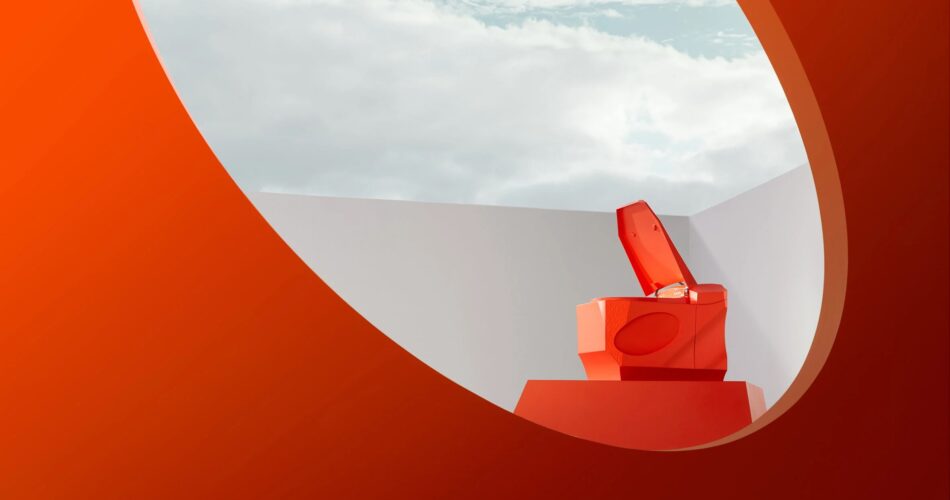Redefining the bathroom experience with a sculptural, functional masterpiece
Designer Samuel Ross created his first toilet for the bathroom brand Kohler with the intention of defying preconceived notions about what a lavatory should look like. The toilet will make its debut during Milan Design Week.
As explained in this article, the Formation 02 smart toilet has a striking orange color with an asymmetrical shape reminiscent of the sharp angles and edges of brutalist architecture.
Its porcelain bowl is encircled by a recycled epoxy resin shell featuring a craggy texture and portions that resemble natural rock, along with some surprising cutouts.
Formation 02, which is slated for limited production, is an attempt, according to Ross, to elevate the common toilet to the status of a “functional sculpture.”








“It has such an intensity that pulls you in by use of the colour and by use of the asymmetry,” he said. “So I would argue that it’s actually closer to a sculpture.”
“It’s also a new price band for that type of product, which will retail at roughly around $25,000 per unit,” he added.
“So it places itself in this incredible grey area in design at the moment, between object and artefact and design object versus functional object.”
After the unveiling of the angular Formation 01 tap at Design Miami last year, Kohler and Ross’s industrial design studio, SR_A have been working together to create several projects; the toilet is the most recent.
Ross, who came from the fashion industry and worked for Off-White under Virgil Abloh before starting his own streetwear brand, A Cold Wall, in 2015, views the collaboration as a chance to rethink the conventional sanitaryware market.
“There hasn’t necessarily been an aberrant on the shape and form that has been disruptive really since the 1960s or 70s,” he said. “It felt like there was such a familiarity with the object that it was one of the last unturned stones within service design.”
“What it is to be a designer, fundamentally, is to be on the edge of risk when it comes to proposing new ideas,” Ross added. “And this was about having a sense of risk and elastic thinking applied to a functional category.”
With this goal in mind, Ross approached the project more like a piece of art than a design assignment, sketching forms on paper rather than CAD files and KPIs.
“I wanted to produce forms that had not been seen before,” he said. “So I wanted to start from a very pure standpoint, which was pen and paper, feeling, and emotion, to determine where we should go in the process.”
In addition to being bright orange, Ross claims that the final design is more “extroverted” than a typical toilet since it is higher and significantly wider. Kohler developed a recycled epoxy resin that was molded into unique moulds and fitted around the ceramic base of the toilet, giving it its various facets and rough, textured sides.
“If we think about the use of textured or recycled epoxy in toilets, it literally doesn’t exist,” Ross said. “So what we’re proposing is pretty much category creation within sanitary solutions.”
“The way in which texture comes into play, the amount of concaves and convexes that have been worked into on the epoxy, which we actually patented as part of the partnership between SR_A and Kohler—all of these advents are new.”
Together, Ross aspires to help the user initially perceive the toilet as a sculpture, prior to learning about its operational capabilities and technological integration. This comprises a nightlight, a heated seat, and a touchscreen control that may be used to operate the bidet, in addition to opening, flushing, and cleaning the toilet.
The Milanese art and design gallery Spazio Maiocchi will be the toilet’s first permanent location after being unveiled as part of a temporary installation during Milan Design Week.
“For the most part, if we’re being really honest, they’re going to be put into galleries, into museums, into high-value corporations, that have an affinity for the arts or value aesthetics,” Ross said.
Other recent attempts to reinvent the toilet have mostly concentrated on functionality. For example, Samsung and Bill Gates collaborated to create a toilet that burns waste “into ashes,” while Swedish bathroom brand Harvest Moon introduced a compost toilet that doesn’t require water.
